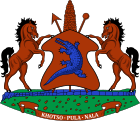Senate of Lesotho
Senate Ntlong ea Mahosana | ||
|---|---|---|
President | Mamonaheng Mokitimi since 11 July 2017 | |
| Structure | ||
| Seats | 33 | |
Length of term | 5 years | |
| Meeting place | ||
 | ||
| Parliament building in Maseru | ||
| Website | ||
| senate.parliament.ls | ||
 |
|---|
29°19′22″S 27°29′33″E / 29.322739542481237°S 27.49252454519462°E
The Senate of Lesotho (
Bicameralism in Lesotho is specifically modeled after the Westminster system of the United Kingdom,[2] having an upper house weaker than the lower.[3] As such, the Senate holds less power than the National Assembly; it cannot initiate legislation, it does not appoint the Prime Minister, and it does not participate in motions of confidence. The Senate's consent is required to amend certain clauses of the constitution, and for a bill to become law, it must be passed by both chambers of Parliament.[4]
The current Senate has a total of 33 members. 22 are hereditary
Mamonaheng Mokitimi is the current president of the Senate. She succeeded Prince Seeiso Bereng Seeiso.
See also
- lower chamberof Parliament
- History of Lesotho
- Legislative branch
- List of national legislatures
- List of presidents of the Senate of Lesotho
References
- ^ Senate of Lesotho. "Senate of the Kingdom of Lesotho". Retrieved 11 February 2019.
- ISSN 0031-2290.
- ^ 'Nyana, Hoolo (2019). "Bicameralism in Lesotho: A review of the powers and composition of the second chamber" (PDF). Law Democracy & Development. 23: 19. Retrieved 8 December 2020.
- ^ 'Nyana 2019, p. 20.
- ^ Nwafor 2013, p. 59: "The composition of the parliament is very instructive when viewed in the context of separation of powers: the King, a chief executive in his own right; a Senate comprised of the principal chiefs, who perform mostly executive functions in their respective communities; and eleven persons nominated by the King, who mostly owe allegiance to the King in the discharge of their legislative functions."
- .
